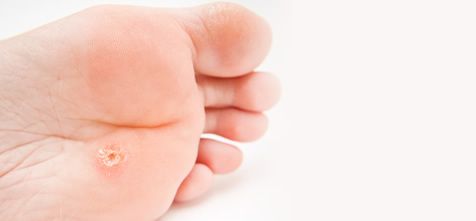Lefort Podiatry provides relief for warts to the local Forest Hill, Doveton, Blackburn, Burwood East & Vermont communities.
Warts on the foot are growths on the skin caused by a virus called Human Papillomavirus (HPV). Plantar warts are the term for those found on the foot and they may be either single warts or a collection of warts covering a large area termed mosaic warts. They are not always painful but may be if they are underneath an area subjected to high pressure such as the ball of the foot and the heel. The virus causes thickening of the top layer of skin and are often mistaken for a corn or callous. Warts are usually acquired from person-to-person contact. The virus is not highly contagious but may cause an infection by entering though a small break in the skin.
Warts are known for being difficult to eradicate as they live in essentially dead layers of skin where there are no cells that detect infection to start the immune response and fight the virus.

TREATMENT OPTIONS FOR WARTS
The choice will depend on how painful the wart is, the location and size of the wart / warts and the age of the patient. Below are the wart treatment options offered as part of our podiatry services offered at Lefort Podiatry:
- Liquid Nitrogen: is a very cold liquid applied by the podiatrist to the wart to freeze the fluid inside the cells so that the wart virus cannot survive. It usually requires several treatment sessions to destroy the wart.
- Acid preparations: is applied by the podiatrist in a paste or paint form made up of 2/3 different acids that aims to erode the wart in a slow and controlled fashion and is usually applied under waterproof tape and left alone until it is changed every 2-3 days. This a slow process and the acid is usually well tolerated but is better for small areas only.
- Formalin 10%: is used mainly for children when the wart is not causing a great amount of discomfort as it is painless and easy to apply using a piece of cotton or gauze soaked in the Formalin. The Formalin acts to dehydrate the cells making it more difficult for the wart virus to survive in the cells. It also irritates the skin making it more likely for the body to detect and initiate an immune response.
- Silver Nitrate: silver nitrate is again painless but is only a temporary treatment in the majority of cases as it forms a cap or “eschar” over the top of the wart that prevents further growth and spread of the wart to other areas. The body sheds the cap in about 2-3 weeks just like it does with a scab and some of the wart tissue may come ofd with the cap but is usually not enough to kill the wart completely.
- Efudix cream: is a prescription medicine that comes in a paste form. It needs to be applied twice daily under a waterproof tape and is usually used for approximately 10 weeks. It is a newer treatment option and works by killing cells that divide and “reproduce” at a rapid rate such as wart cells and for this reason it is known as an antimetabolite medication.
- Deep Needling: is a more aggressive means of treating warts but has been used with higher success rates than some other treatments. The disadvantage is that is requires an injection of local anaesthetic around the wart but the advantage is that usually only 1-2 treatments are required and if there are multiple warts treating only one will often result in eradication of others. This is because the idea of the needling is to push the wart deeper into the 2nd layer of skin, called the dermis, where the immune mediating cells live and initiate an immune response against the virus.
- Surgery: if all else fails and the wart is very painful then surgery or curettage may be considered. This is the surgical removal of the wart by a podiatrist under local anaesthetic in the clinic room.

